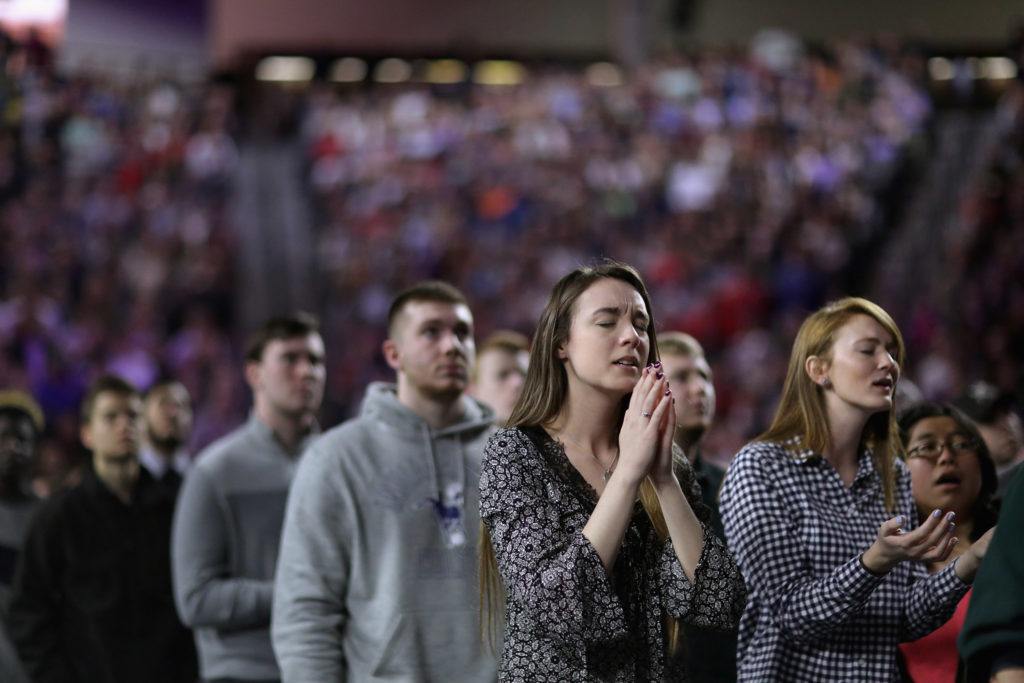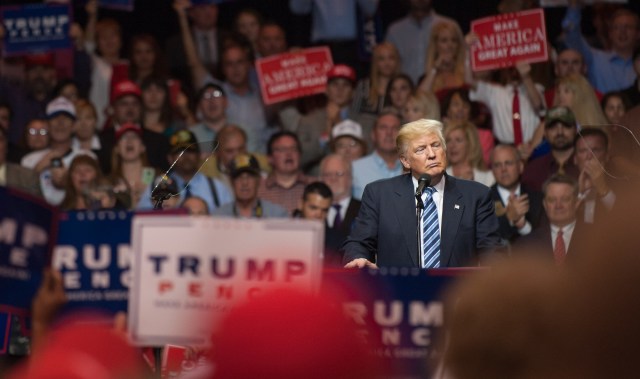An astonishing 80% of white evangelicals supported President Trump (Credit: Jeff Swensen/Getty Images)

Why would this group of Christian believers throw their support behind him? And why didn’t other religious groups do the same?
Our new documentary, Believers in Trump, hears from evangelicals who champion Trump’s presidency, those who abhor it, and from a handful of the uncomfortable millions who tolerate his place in the White House because he delivers on a couple of issues close to their hearts.
This note summaries the key reasons why white evangelicals supported Trump.
He‘s not Hillary
We met with Greg Smith of Pew Research Center, who told us of open questions asked in 2016 to establish the reasons for their support for Trump: “One third of all white evangelical voters that we talked to back in 2016 said that the main reason they support Donald Trump for President is that he is not Hillary Clinton.”
Their vitriol for her is intense, and very different to the impression we in Europe had gained. Her history with her husband’s Presidency, her email thing, all of that. But the two main reasons were that she made no effort to engage with them and she insisted on a pro-abortion campaign.
Michael Wear, author of Reclaiming Hope and a former Obama staffer, says she could have been the most religiously literate Democrat candidate in a generation but blew it. The “deplorables” comment (video below) was the tip of the iceberg. He says she made no attempt to engage with this statistically significant base (26% of the votes cast in the 2016 election were by white evangelicals):
“She could have gone to a Christian college and given a speech about the complexities of religious freedom in the 21st century. She could have given a speech about her lifelong passion for adoption and how that matched with the faith community and particularly with evangelicals but there was no outreach. No interviews with major Christian publications…. not bringing on a faith staffer – someone to reach out to religious communities – until late in the campaign and so it just wasn’t there. It wasn’t, when they looked at key populations when they looked at what they thought was important in running a presidential campaign, religion did not figure into that calculation.”
He promised and delivered a social conservative on the Supreme Court
Justice Scalia died in the same year as Barack Obama’s successor was to be decided and the Republican-controlled Senate made it clear that they would not let the outgoing president choose a liberal justice to replace the Supreme Court’s most conservative member. Composition of the USA’s highest court, which had been politically polarising since 1973’s Roe vs Wade ruling, became central to the presidential election.
Professor Joe Loconte, who does not support the Trump presidency said:
“Much of it boils down to the Supreme Court and the idea that now so much of the cultural debates, cultural fights we’re having are going to be decided in the Supreme Court. Unfortunately, Christian conservatives have kind of bought into that narrative and so getting “the right court nominee” – a Neil Gorsuch in this case, someone who will defend the original intent of the constitution, this became a crucial bellwether moment for evangelicals because they knew they weren’t going to get a good nominee from Clinton of course and it seemed that Trump was going to be willing to appoint that nominee.”
And when evangelicals talk about the Supreme Court…
…they mean access to religious freedom, which many interpret to be the tension between holding religious beliefs about same-sex marriage or transgender expressions which are at odds with the social and even legal mainstream.
…But they mostly mean abortion.
We spoke to Tim Goeglein, Vice President at Focus on the Family and former aide to George W Bush:
“In 1973 our Supreme Court legalized and some would say imposed abortion, legal in all nine months up to and including the birth of the child in the Roe versus Wade decision. This in large numbers brought American evangelicals into the public square.”
From being a rather separatist cohort for much of the 20th century, the 1970s brought white evangelicals out of the woodwork. According to Jim Wallis of Sojourners, the black evangelicals had been in the public square ahead of them:
“Remember the black churches were at the core of the civil rights movement. Without the infrastructure of the black churches there wouldn’t have been a civil rights movement. Dr. Martin Luther King Jr. was a Baptist preacher not just a civil rights leader…The most holistic expression of the Gospel of Jesus Christ in America is always been from the black churches, always. Not white evangelicals, always black churches.
But it took Roe vs Wade to get this group onto the frontline. And now, almost 40 years after Jerry Falwell founded Moral Majority, his son is a regular in the White House and commonly held to be a close adviser to the President. It only took a generation to bring this group from active disengagement to being the voting segment which holds so much power.

He protects their way of life
In his rhetoric on immigration, security and the Middle East, Trump plays not only to the white evangelical base but to the flyover community more broadly. Millions of people live in the states which many decision-makers see only from the sky as they fly from coast to coast for meetings and vacations with fellow elites. Hillary was firmly placed with those elites, as far as our interviewees were concerned.
But for the people described so beautifully in JD Vance’s memoir Hillbilly Elegy, which recounts life in dysfunctional white working-class Kentucky, who worshipped two gods: Jesus Christ and the United States of America, Trump has delivered. To be fair, all the white evangelicals we spoke to were professional middle-class people. Unlike the families described in Hillbilly Elegy, they weren’t routinely posting bail for family members, using food stamps or visiting relatives in rehab. But the flyover states are bigger than just one demographic. There are plenty of God-fearing, nation-loving, hardworking, plain speaking Americans of all classes in that middle strip of the USA.
What they have in common is that they have been unheard for too long and when they chose to make themselves heard, not only did they tip the electoral balance, but they took the rest of the world by surprise – because we hadn’t been listening.
In his travel bans and his rhetoric about Muslims, Trump plays to the fear held by many white evangelicals that their religious hold on the nation is at risk. They fear not only for their physical security – survivalists prepare for terror attacks now, as well as the earthquakes and tornadoes for which they’ve always had drills – but for their spiritual safety. ‘What if we’re over-run by people trying to turn us away from the Lord?’ The anti-immigration narrative holds an additional layer of fear for many.
Make no mistake, not every white evangelical who voted Trump admires his record. Politically, of course, he doesn’t have a record, which is part of the attraction for an electorate bored and disillusioned by years of the same old campaign trail promises, rarely delivered. But he does have a clear and consistent track record of behaviour, and it’s not attractive to many people, especially socially conservative Christians who value faithful marriage and abhor vulgar talk.
There’s a very uncomfortable resignation among many of these voters; people are holding their nose and tolerating an aggressive, insensitive President for four or even eight years in the hope and even expectation of lifelong appointments to the Supreme Court. Even when it means, as it did for some of the parents we heard from, that they struggle to justify to their daughters why they voted for a man they wouldn’t want as a role model for their sons.
It’s a very UnHerd story. Here are a bunch of people – far more than you’d think – who hold some beliefs very deeply, and feel very strongly that their elected leaders don’t understand them. Between them, they were able to buck what they believed to be the liberal secular trend, and turn a nation in a different direction.
How far that will take them, and where they’ll get to, is another story. But the tale of how and why they decided to take the path is worth studying.
All articles in this series are being tagged by “Believers in Trump”.










Join the discussion
Join like minded readers that support our journalism by becoming a paid subscriber
To join the discussion in the comments, become a paid subscriber.
Join like minded readers that support our journalism, read unlimited articles and enjoy other subscriber-only benefits.
Subscribe